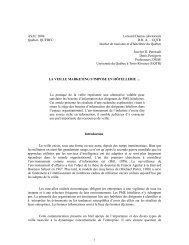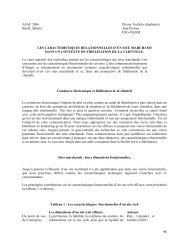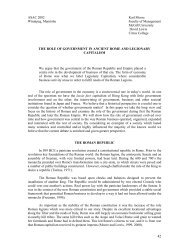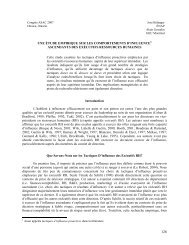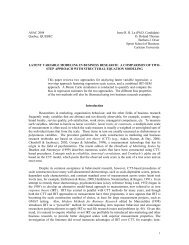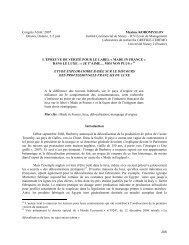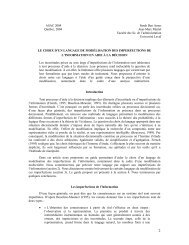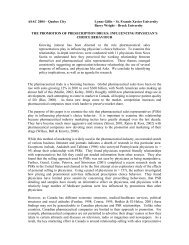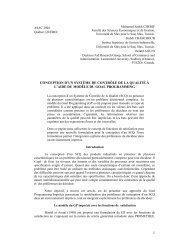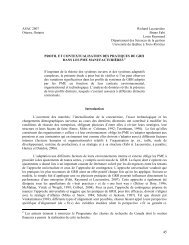ASAC 2004 Iain Murray Quebec (Quebec) School of Hospitality and ...
ASAC 2004 Iain Murray Quebec (Quebec) School of Hospitality and ...
ASAC 2004 Iain Murray Quebec (Quebec) School of Hospitality and ...
Create successful ePaper yourself
Turn your PDF publications into a flip-book with our unique Google optimized e-Paper software.
Based on his research findings, Hall (<strong>2004</strong>) suggested that too many public<br />
administrative agencies within a region may actually hamper success, while the existence <strong>of</strong> a<br />
champion, <strong>and</strong> the hosting <strong>of</strong> meetings to develop relationships could figure significantly into<br />
successes <strong>of</strong> creating cooperative networks <strong>and</strong> clusters. In the same paper, Hall noted that the<br />
Australian Bureau <strong>of</strong> Industry Economics suggested that governments could potentially play the<br />
following roles in network development:<br />
• information dissemination<br />
• encouraging cooperation within industries<br />
• improve existing networks between public sector agencies <strong>and</strong> private companies<br />
• examine the effects <strong>of</strong> existing legislation on the formation, maintenance, <strong>and</strong> break-up <strong>of</strong><br />
networks.<br />
Cooperation <strong>and</strong> Trust<br />
The literature clearly emphasizes the need for cooperation among participating<br />
businesses, governments, <strong>and</strong> individuals. Unfortunately, there is also very clear indication that<br />
cooperation is difficult to achieve in practice ( Reid et al 2000; Briedenhann <strong>and</strong> Wickens, 2003;<br />
Hall <strong>2004</strong>). If a rural tourism initiative is to succeed however, then the need for, <strong>and</strong> the benefits<br />
<strong>of</strong>, cooperation must be clearly <strong>and</strong> indisputably presented to all potential participants. Rosenfeld<br />
(1997) noted that in order for groups <strong>of</strong> operators to work successfully together, there must be<br />
“…reciprocity <strong>and</strong> sufficient levels <strong>of</strong> trust to encourage pr<strong>of</strong>essional interaction <strong>and</strong><br />
collaborative behaviour”.<br />
In his research, unfortunately, Hall (<strong>2004</strong>) noted that while tourism operators tend to be<br />
quite positive towards the wine <strong>and</strong> food industries, the same is not true <strong>of</strong> the wine <strong>and</strong> food<br />
industries towards the tourism industry. Wineries <strong>and</strong> food producers, such as cheese-makers, did<br />
not see themselves as being part <strong>of</strong>, nor having any reason to be interested in, the tourism industry<br />
or tourists.<br />
The message for rural tourism initiatives, therefore, is that farmers, producers,<br />
restaurateurs, artisans <strong>and</strong> others must come to see themselves as part <strong>of</strong>, <strong>and</strong> benefiting from, the<br />
broader tourism industry. Clearly, this is no small task, <strong>and</strong> champions (see below) have a<br />
responsibility to promote both the economic <strong>and</strong> social benefits <strong>of</strong> the formation <strong>of</strong> cooperative<br />
relationships between a wide variety <strong>of</strong> businesses.<br />
Champion (Leadership)<br />
A major potential stumbling block to rural tourism initiatives is the absence <strong>of</strong> a<br />
champion, <strong>and</strong> continuity in this leadership (Hall, 2002, <strong>2004</strong>). Major long-term initiatives tend<br />
to fail when leadership is either lacking or inconsistent. Such initiatives need to have one person<br />
take the leadership role <strong>and</strong> stick with it for the long term. In order to help ensure that this<br />
happens, the ‘players’ <strong>and</strong> the champion both need to commit to the project for several years <strong>and</strong><br />
provide the support necessary to give the initiative a reasonable chance at being successful.<br />
While the presence <strong>of</strong> a champion may be somewhat less important to the establishment<br />
<strong>of</strong> a culinary centre in an urban area, it is an “essential” for the establishment <strong>of</strong> a culinary centre<br />
in a rural area. As mentioned above under cooperation <strong>and</strong> trust, if a rural culinary tourism<br />
initiative is to be successful, then ‘players’ who would not normally consider tourism as having<br />
anything to do with them, much less any benefit to them, must be clearly shown the economic<br />
connection. Just as wineries do not see themselves as being a part <strong>of</strong> the tourism industry (Hall<br />
5




